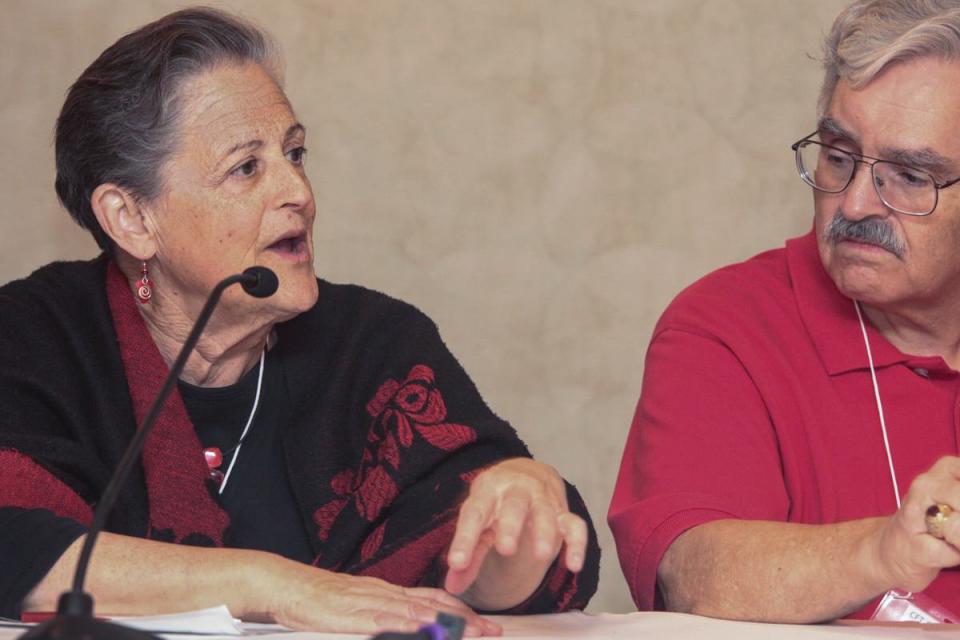Newsroom
Retirees! CFT welcomes your participation in the new Council of Retired Members
CFT has formed a new division welcoming retiree participation and action, the Council of Retired Members. It is the first constitutional division the union has added in several decades. The Council elected its first officers at CFT Convention on March 20.
One by one: Organizing team signs up part-time faculty
Why does anyone join the union? …because someone asks them
Member organizers from local unions throughout the state joined forces at Palomar College to meet one-on-one with part-time faculty agency fee payers who had not yet signed their union cards — and asked them to join the union.
Local Wire, Apr-May 2015
ADULT EDUCATION
Funding in limbo… The last few years have been a
terrible time in the adult education world, according to Jack
Carroll, the executive director at the Pajaro Valley Federation
of Teachers. Carroll, who teaches office skills to adults, hopes
AB86 will alleviate that by providing $25 million for adult
education.
Floor debate: Delegates tackle rich array of social justice and education topics
Delegates took on social justice concerns, passing a resolution from the United Educators of San Francisco and the CFT Executive Council to officially support the “Black Lives Matter” movement. Resolution 23 calls for community meetings, teach-ins and curricula, such as what’s already posted on UESF’s website and AFT’s Share My Lesson.
Robert Chacanaca: The workers’ advocate
When he accepted the Raoul Teilhet Educate, Agitate, Organize Award, Robert Chacanaca, known as “Chaca,” asked for a moment of silence to remember Teilhet, the former CFT president who successfully pursued collective bargaining.
CFT supports families of missing Mexican students
Survivor tells horrific tale of persecution and murder
Angel Neri described the unique education given students at the Raul Isidro Burgos School in Ayotzinapa, Guerrero, in his speech at CFT Convention. The school takes students from rural farming communities, trains them as teachers, and then encourages them to return to work in schools in the poorest, most remote communities in Mexico. This has earned the school the enmity of corrupt and violent elements of Mexican society.
Librarian masters digital tools for workplace and union
Carla Arbagey creates infographics to illustrate workload
UC Riverside librarian Carla Arbagey says, “Technology is like air to me.” It is essential in the library, where she integrates systems and tracks information on more than 3.4 million items. She is the winner of the 2014 Technology New Leader Award from the California Library Association, and a self-described “type-A personality” who likes things to be tidy, organized, and efficient.
Jeff Duncan-Andrade: The effect of toxic stress on student lives
Jeff Duncan-Andrade grew up in Oakland, the youngest of seven children. He remembers one day when his mother sat him down, showed him a glass of water, and asked him if it was half full or half empty.
Freeway Flyers: Local action & quick news
Santa Maria part-timers negotiate numerous improvements
Part-time instructors at Allan Hancock College negotiated an 8 percent pay increase over the next two years starting this spring when all part-time academic employees received a 4 percent salary increase. They will get a 2 percent raise this fall and another in fall 2016. In a tremendous boost, service faculty (counselors, librarians, and nurses) received an additional 20 percent pay increase.
New CFT bills create minimum job security standards, strengthen the 75:25 regulation
Job security and due
process for part-time faculty
AB 1010 (Medina, D-Riverside)
This bill calls for the establishment of minimum standards for part-time faculty job security. If enacted, it would require all California community colleges without a collectively bargained contract that provides equivalent or stronger job security and due process rights to establish a seniority list for part-time faculty rehire.
Loan forgiveness program may bring relief
Last year, Sen. Dick Durbin (D-Illinois) made headlines with his “Adjunct Faculty Loan Fairness Act,” a bill that would have made it much easier for part-time faculty to benefit from the federal Public Service Loan Forgiveness program, designed to encourage graduates to pursue a career in public service by offering loan forgiveness for those working full-time in government or the non-profit sector.
Paying for time but not for space: The need for a “room of one’s own” on campus
FIRST PERSON | Linda Sneed
We all know that our work takes place not just during scheduled class meetings, in classrooms on college campuses. We work in many times and places: early in the morning, through mealtimes, and late at night; in our cars, on public transportation, on our phones and personal computers, at home, in coffee shops, in public libraries.

